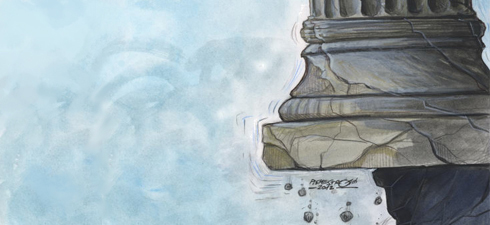On June 17 Greece is heading for a crucial vote in a climate of national economic, social and political collapse. The acts of violence in society and in politics are stoking the tension, and the statistics on the country’s economy leave no wriggle room to whatever government emerges from the polling booths. The country is essentially becoming internationally isolated, since large credit insurance companies (Coface, Euler-Hermes) have stopped insuring imports to Greece, and Greek companies, which have to pay cash for their imports, are struggling to stay alive.
The danger of raw material, medicine and food shortages is palpable and calls for immediate responses; representatives of the business community are already talking about “a nightmare reminiscent of Hoxha’s Albania” if no solution is found.
Greek companies lack raw materials, so their production depends on imports. On the energy front, the country is teetering on the brink of disaster: credit has run out, and Greece may soon lose access to the Iranian market because of the international embargo imposed on Tehran.
Pro-system vs anti-system
Meanwhile, economists and international political circles feel the possibilities of leaving the country in the euro area are increasing, now that the country’s isolation is reflected in the freezing of commercial exchanges and agreements in tourism, trade, and transport. Multinational corporations still active in Greece are meanwhile taking precautions and keeping very little cash in-country.
In this environment of political tensions coming to the fore, especially after the violent incident between political representatives shown on television last week, or the case of Paiania [a 15-year-old boy who took the law into his own hands and killed a burglar to protect his family), most political analysts believe strongly that the June 17 elections will be dominated by the ‘vote of fear’, while the ‘anger vote’ of May 6 fades into the background.
Most researchers already have data on trends that they hope to use to figure out which way the vote will go, based on the polls recorded at the beginning of last week, but are unsure about whether the attack by the deputy of the Golden Dawn party on the communist party deputy will have a major effect on the outcome.
An analyst who works with one of the former major political parties believes that the very character of the election has changed. “The elections of May 6 were decided by anger; the June 17 elections will be decided by fear," he said, on condition of anonymity. He estimates that the so-called ‘pro-system voting’ [for parties in favour of the memorandum on austerity] will strengthen, followed by a contraction of anti-system voting. His analysis points up two characteristics.
One concerns the evolution of some voters who, “in total ignorance”, voted for the Golden Dawn in the last election but who, sticking with the anti-memorandum logic, will vote in the end for Syriza, the Coalition of the Radical Left [which came second on May 6 and is the favourite to win on June 17]. He also considers it will be possible to limit the drain of Communist Party voters to Syriza.
Golden Dawn is already in decline
The second characteristic concerns the probability of a decline in the anti-system vote, in the switching of Golden Dawn voters to the Party of the Independent Greeks [right-wing party opposed to the memorandum] and especially by those who will not vote for left-wing or centre-right. According to the president of a leading polling organisation, the Golden Dawn is already in decline and cannot climb back up to the seven percent it won on May 6. What remains to be seen is whether the neo-fascist party will return to Parliament or remain outside it.
Most political analysts and opinion pollsters believe, therefore, that next Sunday we should expect a stronger rally of “more conventional political forces”, among which is Syriza, now one of the dipoles of decision-makers that will shape the country’s future.
This means that the distancing of political parties [from their previous positions] will encourage a wave of migration to the majority parties based on the May 6 returns, while at the same time there will be a wave of “voter switches” between the smaller or so-called ‘extremist’ parties, with one possible consequence being the difficulty for any one of them to get into Parliament. “Last Thursday it was still thought that the most vulnerable party was the Independent Greeks. The Golden Dawn is now another, because its voters are less homogenous,” says one expert.
This is the first in a series of five papers from the Greek press.
Was this article useful? If so we are delighted!
It is freely available because we believe that the right to free and independent information is essential for democracy. But this right is not guaranteed forever, and independence comes at a cost. We need your support in order to continue publishing independent, multilingual news for all Europeans.
Discover our subscription offers and their exclusive benefits and become a member of our community now!












